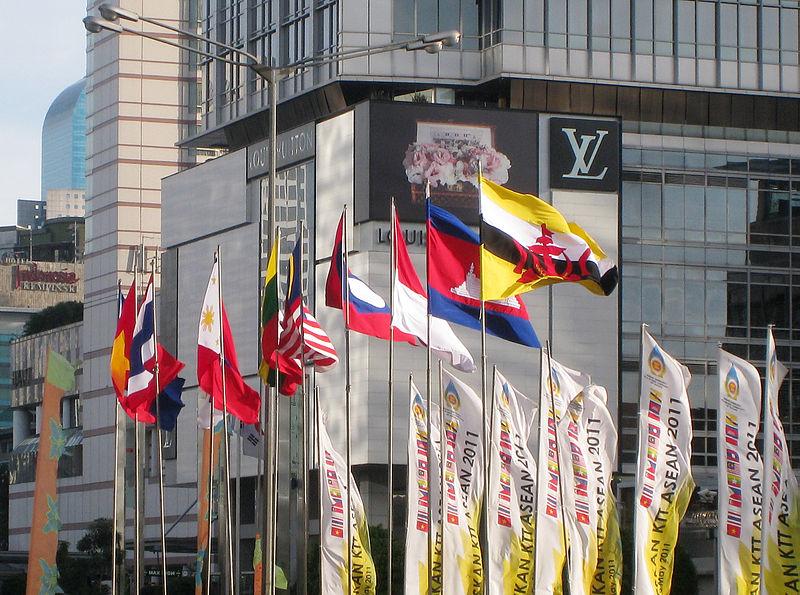ASEAN community-building efforts need Australia’s strong support
Posted By Tanya Ogilvie-White on August 28, 2013 @ 06:00
 [1]Rising strategic tensions in the Asia-Pacific could derail ASEAN’s security-building efforts, despite the concrete progress that ASEAN members have made in addressing mutual challenges. The consequences could be serious for Australia, which has benefitted from a long period of strategic stability and efforts to improve security standards in its near neighbourhood.
[1]Rising strategic tensions in the Asia-Pacific could derail ASEAN’s security-building efforts, despite the concrete progress that ASEAN members have made in addressing mutual challenges. The consequences could be serious for Australia, which has benefitted from a long period of strategic stability and efforts to improve security standards in its near neighbourhood.
About 10 years ago, the UN secretariat realised that regional mechanisms could be effectively utilised to address security challenges, many of which are transnational. Scholars, including me [2] (PDF), have argued that this approach should be a particular priority in Southeast Asia, where insurgency, terrorism, and high levels of corruption and transnational crime combine with porous borders, busy ports and major transhipment hubs to create a potent cocktail of threats and vulnerabilities [3]. The strain this places on the region’s developing states is overwhelming, highlighting the importance of ASEAN’s goal of developing a regional security community.
The ASEAN Regional Forum [4] and its track two network, the Council on Security Cooperation in the Asia Pacific (CSCAP) [5], have played an important part in the process of regional security-building. Over the past two decades, they’ve had a key role in trust-building, agenda-setting, norm diffusion and even policy implementation in the region. They’ve helped shine a light on mutual vulnerabilities, leading to significant progress [6] in key areas, including the implementation of counter-terrorism legislation and measures to prevent the proliferation of materials that could be used in nuclear, biological, and chemical weapons.
Concrete achievements in these areas aren’t difficult to find. There’s been slow but genuine progress in the implementation of UN Security Council resolution 1540 [7], which obliges all states to keep materials that could be used in the development of weapons of mass destruction out of the reach of terrorists and other malicious actors. ASEAN members have also been signing up to international counter-terrorism mechanisms and accepting offers of capacity-building assistance from developed states and international organisations. In the nuclear security sphere, assistance missions [8] provided by the International Atomic Energy Agency have helped states ensure that nuclear research reactors and other facilities are physically protected against non-state threats. All of this has been facilitated by the emphasis that the ARF, CSCAP, the Asia-Pacific Safeguards Network and other regional bodies have placed on the need for states in the region to think of security-building as a shared and mutually beneficial obligation.
That’s all good news, but strategic changes that are underway in the wider region are endangering progress. There’s a discernible shift in emphasis in the Asia-Pacific, away from regional and global security governance and towards a stronger focus on traditional strategic concerns [9]. Uncertainty’s the main culprit here, caused by the rise of China and changing relations between the US, China, Russia, Japan, and India—especially interactions concerning territorial and maritime disputes, cyber issues and reconstituted deterrence debates. Increasingly, these raw strategic dynamics are exacerbating regional proliferation pressures, fuelling nationalism and promoting a return to zero-sum thinking.
Unfortunately, these developments are having serious knock-on effects in Southeast Asia [10], reigniting territorial disputes in the South China Sea and creating new frictions among ASEAN members, which, if left unchecked, could undo much of the progress that ASEAN and its network of political and functional mechanisms have achieved.
The challenge for ASEAN members, for Australia, and for other states that have a direct interest in the security and stability of Southeast Asia, is to prevent these tensions from draining the momentum from ASEAN-centred cooperative security efforts. To do this, the strategic insecurities that encourage secrecy and suspicion need to be countered by consistent and sustained efforts to promote dialogue, trust and transparency. To this end, it would help if Australian officials and political elites did more to publically acknowledge the central role that regional organisations play in this process. Rather than perpetuating a culture of denigrating the ASEAN Regional Forum, CSCAP and other ASEAN-centric mechanisms as rather pointless, resource-draining talk shops, it would be much wiser to highlight and support their vital political function. This is just as central to Australia’s interests and obligations as it is to ASEAN’s.
Tanya Ogilvie-White is a senior analyst at ASPI. Image courtesy of Wikimedia Commons [11].
Article printed from The Strategist: https://aspistrategist.ru
URL to article: /asean-community-building-efforts-need-australias-strong-support/
URLs in this post:
[1] Image: https://aspistrategist.ru/wp-content/uploads/2013/08/800px-ASEAN_Nations_Flags_in_Jakarta_3.jpg
[2] including me: http://csis.org/files/attachments/130829_Non-proliferation%20and%20Counter-terriorism%20in%20SE%20Asia.pdf
[3] a potent cocktail of threats and vulnerabilities: http://www.cscap.org/uploads/docs/CRSO/CRSO2013.pdf
[4] ASEAN Regional Forum: http://aseanregionalforum.asean.org/about.html
[5] Council on Security Cooperation in the Asia Pacific (CSCAP): http://csis.org/programs/pacific-forum-csis/cscap
[6] significant progress: http://www.lowyinterpreter.org/post/2013/03/14/ASEANs-coming-of-age.aspx
[7] progress in the implementation of UN Security Council resolution 1540: http://www.un.org/en/sc/1540/site-news.shtml
[8] assistance missions: http://www.iaea.org/Publications/Booklets/Ssp/reactors.html
[9] stronger focus on traditional strategic concerns: http://www.atimes.com/atimes/Southeast_Asia/SEA-01-220213.html
[10] knock-on effects in Southeast Asia: http://www.economist.com/news/asia/21571461-hopes-calmer-times-under-years-new-management-all-change-asean
[11] Wikimedia Commons: http://en.wikipedia.org/wiki/File:ASEAN_Nations_Flags_in_Jakarta_3.jpg
Click here to print.